Of all the running races you’re likely to be reading about online, the 5K is one of the least demanding—and least intimidating. Sure, it’s tough, but it’s for good reason that there are plenty of couch-to-5K training programs instead of couch-to-marathon programs. It’s a great starting point for your first race.

But exactly how many miles is a 5K? I’ll give you all the stats, plus explanations from elite running coach Lee Whitaker.
Key Takeaways
- A 5k run is 3.1 miles.
- The average time to complete a 5k is 23:58.
- The average runner can expect to complete a 5k in 20-25 minutes, whereas a beginner runner may expect to complete a 5k in about 30-40 minutes.
- It can take about 2 months to train for a 5k.
How Many Miles Is a 5k Run?
A 5K race is 3.1 miles long—the most frequently run distance event. The fact that it is a relatively short distance and an entry gate to competitive distance running makes it one of the most popular race distances for first-time runners who are fresh off the couch.
“Everything is relative to present fitness ability,” admits Whitaker. “However, if you are already in decent shape and have been working out, you could probably train for a 5K and do reasonably well in six weeks. Obviously the more time you have, the better your chances will be, but six weeks is enough time for you to see some solid improvement in all aspects of your performance.”
If you’re starting from a lower baseline fitness level, you might need closer to two months or perhaps longer. Listening to your body is the biggest key here.
How Many Miles Is a 10K Run?
Calculating the distance of a 10K run is a very simple mathematical exercise, as it is literally twice the distance of a 5K. As such, a 10K doubles the 3.1 miles of a 5K and offers you a distance of 6.2 miles. This comes with a few training modifications to prepare you to run the race optimally.
[Read More: 10K Training Plan From a Running Expert]
“The easiest way to ensure success in a 10K is to double the training distance and double the time spent training,” suggests Whitaker. “So you’re looking at 12 weeks of training as you work to gradually extend the distance you cover.”
How Many Miles Is a Half Marathon?
A half marathon takes the relatively well-known distance of a marathon — 26.2 miles — and chops it in half. Therefore, you’ll be running 13.1 miles, which is more than double that of a 10K. Even so, the training tweaks required to conquer this distance aren’t quite that severe.
[Read More: How to Run a Faster Mile, According to a Running Coach]
“You don’t have to double the training time again going from a 10K to a half marathon in order to perform reasonably well in it,” explains Whitaker. “I would still say at least 16 weeks is probably safe for that. You could build appropriately for that distance and also add the right amount of intensity training to adequately perform during a half marathon.”
How Many Miles Is a Marathon?
Even people who have never even dreamed of running a marathon may know that a marathon is 26.2 miles long. The doubling of the distance from a half marathon to a full marathon is not for the faint of heart. Given that, you are advised to take your preparations very seriously if you intend to run the full distance.
[Read More: How Long Is a Marathon?]
“I like to tell first-timers in particular, they probably need at least six months of training to adequately prepare for a marathon,” says Whitaker. “Could you do it in a little shorter time maybe? Yes—but I think six solid months of really good training is just a good rule of thumb for most people.”
How Many Miles Is an Ultramarathon?
While you may hear of ultramarathons that vary in distance by a wide margin, don’t fret—there’s a simple standard. An ultramarathon can refer to any running distance greater than a marathon that you’re supposed to cover during a single racing effort. Despite vast differences in the distance covered, the type of training required to run an ultramarathon won’t vary much from that required to run a marathon.
[Read More: How Many Miles Should I Run a Day?]
“The total amount of time and mileage doesn’t really change from a marathon to even a 100-mile race,” says Whitaker. “There’s a lot of structural changes that take place in the body as you train. Your heart gets bigger. Your blood flow gets more efficient, your capillaries and mitochondria increase. At some point, training at any level, we start to have diminishing returns. There’s just limits to physics, biology, and genetics. Your heart can only get so big, you can only force so much blood through your body.”
What’s a Good 5K Time?
A good 5K time will vary from person to person and depend on a wide array of factors. For example, the average 5K time across all ages and genders is 23:58, but that exact same time is considered elite for all men aged 70 or older. Conversely, that time would be considered advanced for all women younger than 20 or older than 30.
You can estimate your general progress in relation to the average time for your gender assigned at birth, which assumes you are faster than half of all runners of that gender across all ages. For men, this average 5K time is 22:31, and for women, this time is 26:07. There is not enough data on nonbinary runners to give a number for these athletes.

Improving on these times by just one minute — or 20 seconds per mile — will place you within or very close to the advanced category for most age groups.
How to Calculate Your 5K Time
In the technologically sophisticated age we live in, some fairly reliable apps and programs can be used to extrapolate the times for long races based on shorter distances. In the case of a 5K, you can plug your one-mile run time into a program like the McMillan Running Calculator, and it will spit out a projected 5K time for you. However, even in the absence of a complex calculator, there are ways to identify a target time on your own.
[Read More: How Long Does It Take to Run a Mile?]
“In the case of determining a 5K time based on a mile time, let’s say you run a six-minute mile,” Whitaker says. “I would triple the mile time, which gets it to 18 minutes. Then I would add about 15 percent to that. That’s 1,080 seconds that you’re adding about 160 seconds to. So I would estimate that you would probably be getting up around 21 minutes for a 5K.”
[Read More: How to Calculate How Many Steps Are in a Mile]
Tips for Running a Faster 5K
You can make improvements to your 5K time simply by making frequent appearances at an outdoor track and haphazardly running, but a structured training plan would serve you far better. To help you run faster, here are a few valuable running tips provided by an expert-level running coach. These tips will come in handy no matter how far you intend to run, but especially if you want to run a faster 5K.
Build Your Aerobic Base
Your running speed during a distance event has more to do with how long you can sustain your race pace than what the top speed you can achieve is. If you want to stand at the starting line with confidence on race day, you need to know that you can sustain your running pace for the entire race distance through the finish line. This is why it’s crucial for all runners to feature aerobic training in their running programs. (1)
Include Speed Work
Beyond possessing the endurance to sustain their forward progress, new runners need to work on stretching their speed limits, elevating their heart rates, and forcing their bodies to tolerate everything that comes with it.
This is why interval training should find a permanent home in your training schedule. Learning to move faster and tolerate the discomfort is essential to lowering your 5K time. (2)
Build Your Strength
What you do during your weight room workouts has a significant influence on how fast you are able to run. Most experienced runners now engage in some form of regular strength training; cross-training with weights.
[Read More: How to Strength Train for Your 5K (and Why You Should)]
This will enable you to press your feet against the ground with greater force. Strength training also directly correlates with greater speed. (3)
Train Safely
Even some advanced runners often neglect measures that are built into training plans to ensure safety and longevity, like a pre-workout warm-up, a post-workout cooldown, and rest days. Not only can partaking in these reduce your risk of injury from running, but they will also ensure that you can achieve peak workout performance, and be physically healed for subsequent training sessions. (4)
Frequently Asked Questions
How many miles is a 5K exactly?
A 5K is 3.1 miles. It is one of the most frequently run distances in competitive races.
How many minutes should a 5K run take?
The average time for a 5K run across ages and genders is 23:58, but there is a lot of variability in 5K finish times. A 5K time that is in the range of 20 minutes would be considered advanced— if not elite—for a runner of any age regardless of gender.
What is a good 5K time for a woman?
There is a lot of variability concerning what is a good 5K time for women. The average 5K time for women across all age groups is 26:07, but this time is regarded as advanced for all women 55 and older.
References:
- Haugen T, Sandbakk Ø, Seiler S, Tønnessen E. The Training Characteristics of World-Class Distance Runners: An Integration of Scientific Literature and Results-Proven Practice. Sports Med Open. 2022 Apr 1;8(1):46.
- Atakan MM, Li Y, Koşar ŞN, Turnagöl HH, Yan X. Evidence-Based Effects of High-Intensity Interval Training on Exercise Capacity and Health: A Review with Historical Perspective. Int J Environ Res Public Health. 2021 Jul 5;18(13):7201.
- Prieto-González P, Sedlacek J. Effects of Running-Specific Strength Training, Endurance Training, and Concurrent Training on Recreational Endurance Athletes’ Performance and Selected Anthropometric Parameters. Int J Environ Res Public Health. 2022 Aug 29;19(17):10773.
- Orlando C, Levitan EB, Mittleman MA, Steele RJ, Shrier I. The effect of rest days on injury rates. Scand J Med Sci Sports. 2011 Dec;21(6):e64-71.
Featured Image: Hananeko_Studio / Shutterstock